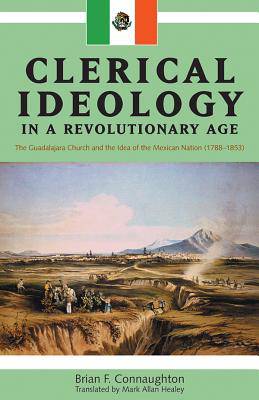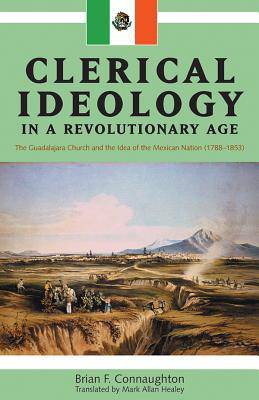
Door een staking bij bpost kan je online bestelling op dit moment iets langer onderweg zijn dan voorzien. Dringend iets nodig? Onze winkels ontvangen jou met open armen!
- Afhalen na 1 uur in een winkel met voorraad
- Gratis thuislevering in België vanaf € 30
- Ruim aanbod met 7 miljoen producten
Door een staking bij bpost kan je online bestelling op dit moment iets langer onderweg zijn dan voorzien. Dringend iets nodig? Onze winkels ontvangen jou met open armen!
- Afhalen na 1 uur in een winkel met voorraad
- Gratis thuislevering in België vanaf € 30
- Ruim aanbod met 7 miljoen producten
Zoeken
Clerical Ideology in a Revolutionary Age
The Guadalajara Church and the Idea of the Mexican Nation, 1788-1853
Brian F Connaughton
€ 56,95
+ 113 punten
Uitvoering
Omschrijving
Clerical Ideology in a Revolutionary Age: The Guadalajara Church and the Idea of the Mexican Nation, 1788-1853 clearly delineates the role of the Catholic Church in the making of Mexico as a nation. It provides a nuanced sense of clerical thought during the turbulent years leading to and following Mexico's national independence. Connaughton delves deeply into various primary sources from Guadalajara between 1788 and 1853, including printed sermons of high clergymen, contemporaneous newspapers, pamphletry, and pastoral letters. Analyzing this literature in the broader context of the Enlightenment, Connaughton looks at the Enlightenment's potentially corrosive ideas, the rise of liberalism, the complex relationship between Church and State, and the spread of secular mentality. With a balanced approach to clerical discourse, this study of the substance, contradictions, and evolution of Church thinking and political posturing in the face of Bourbon Reforms and the rise of liberalism should be required reading for any student or scholar of Mexican history.
Specificaties
Betrokkenen
- Auteur(s):
- Uitgeverij:
Inhoud
- Aantal bladzijden:
- 435
- Taal:
- Engels
- Reeks:
- Reeksnummer:
- nr. 3
Eigenschappen
- Productcode (EAN):
- 9781552380833
- Verschijningsdatum:
- 15/02/2003
- Uitvoering:
- Hardcover
- Formaat:
- Genaaid
- Afmetingen:
- 140 mm x 225 mm
- Gewicht:
- 716 g

Alleen bij Standaard Boekhandel
+ 113 punten op je klantenkaart van Standaard Boekhandel
Beoordelingen
We publiceren alleen reviews die voldoen aan de voorwaarden voor reviews. Bekijk onze voorwaarden voor reviews.











